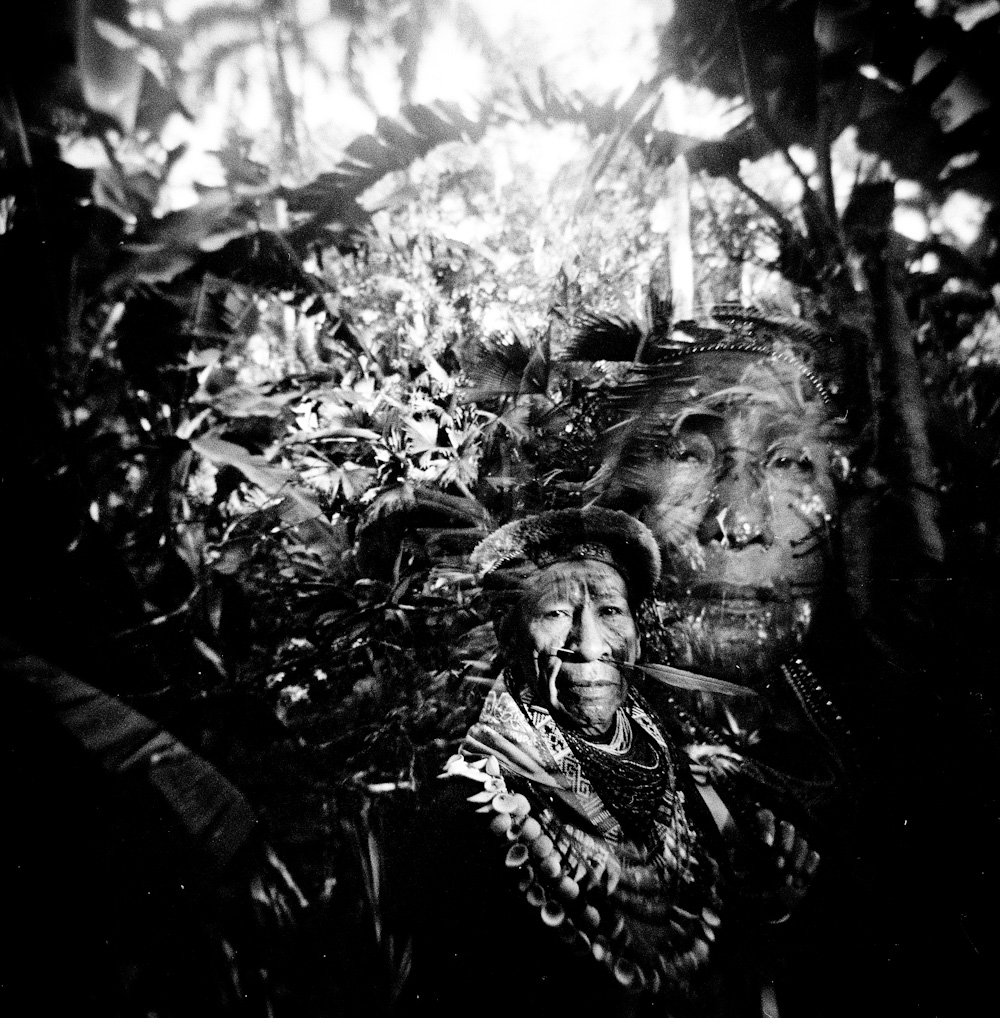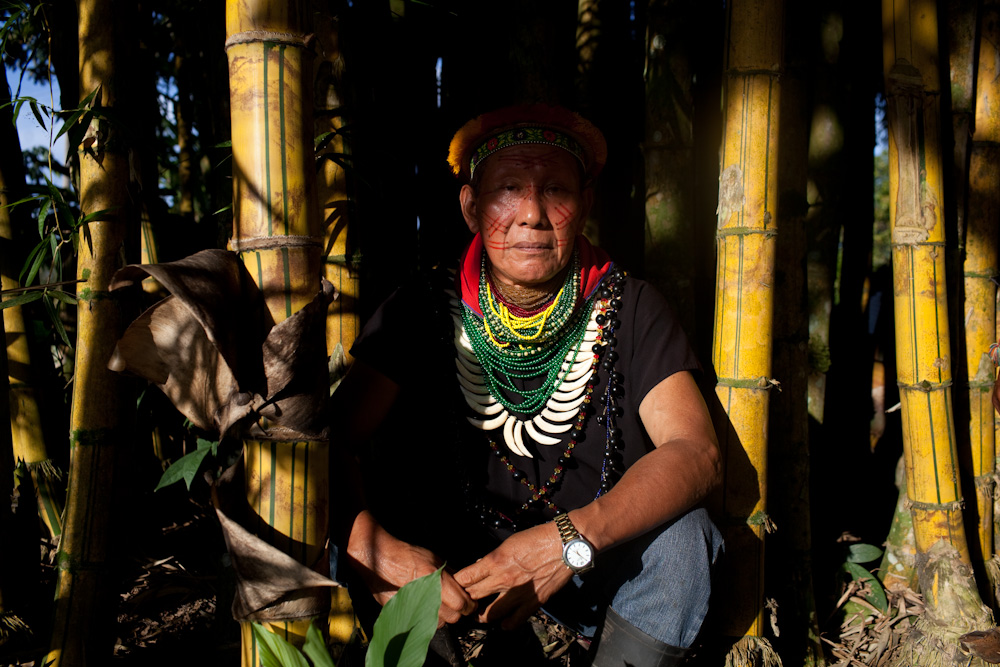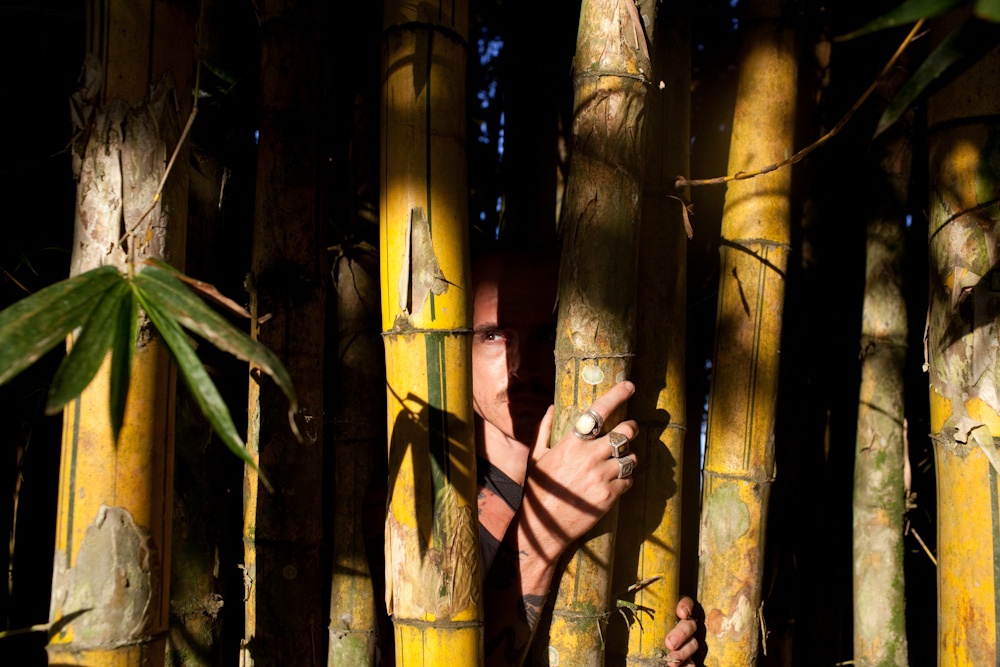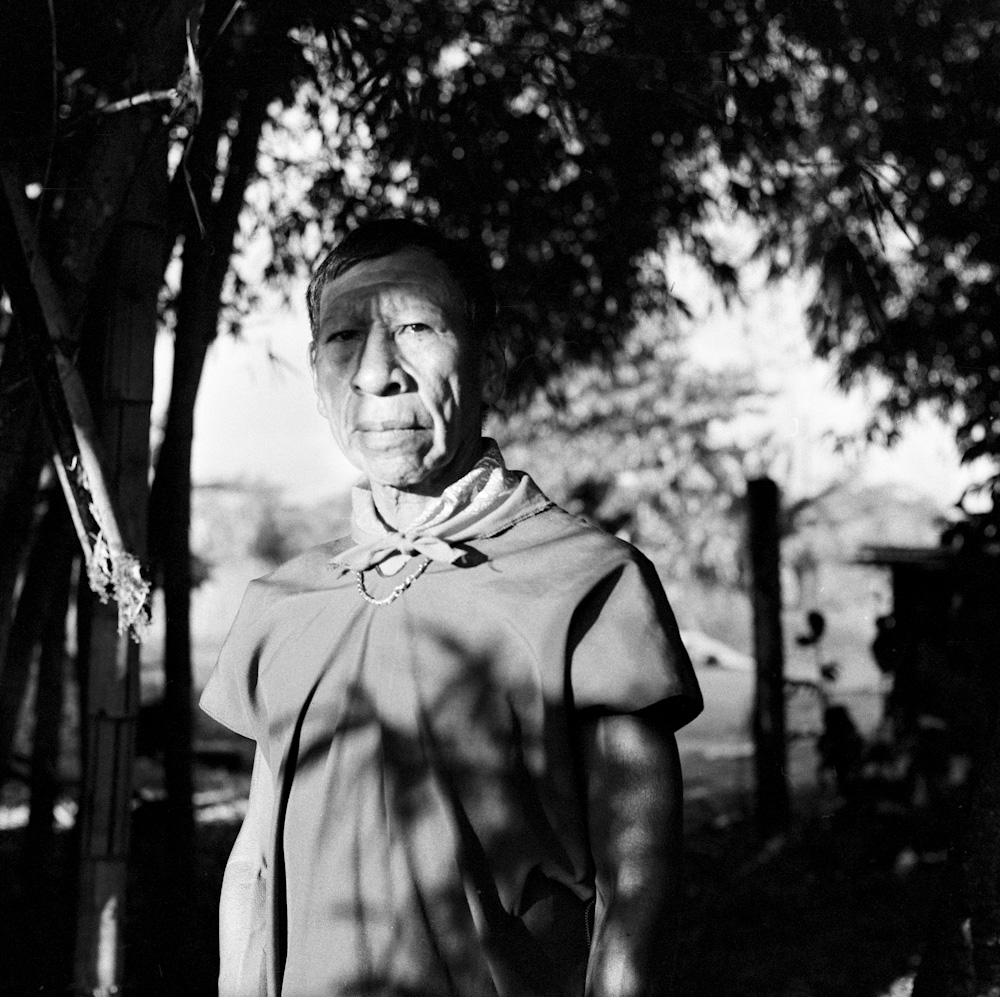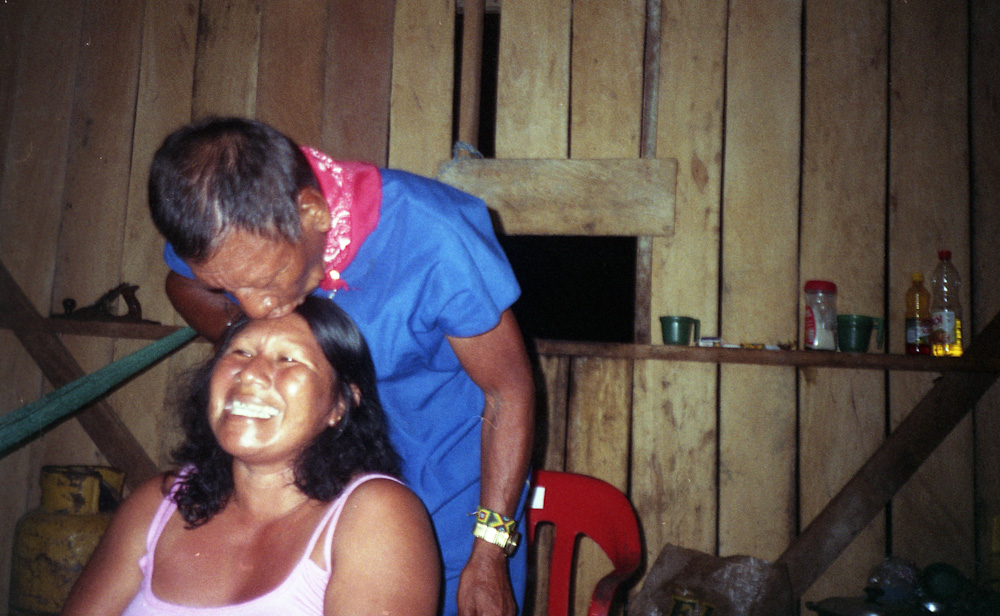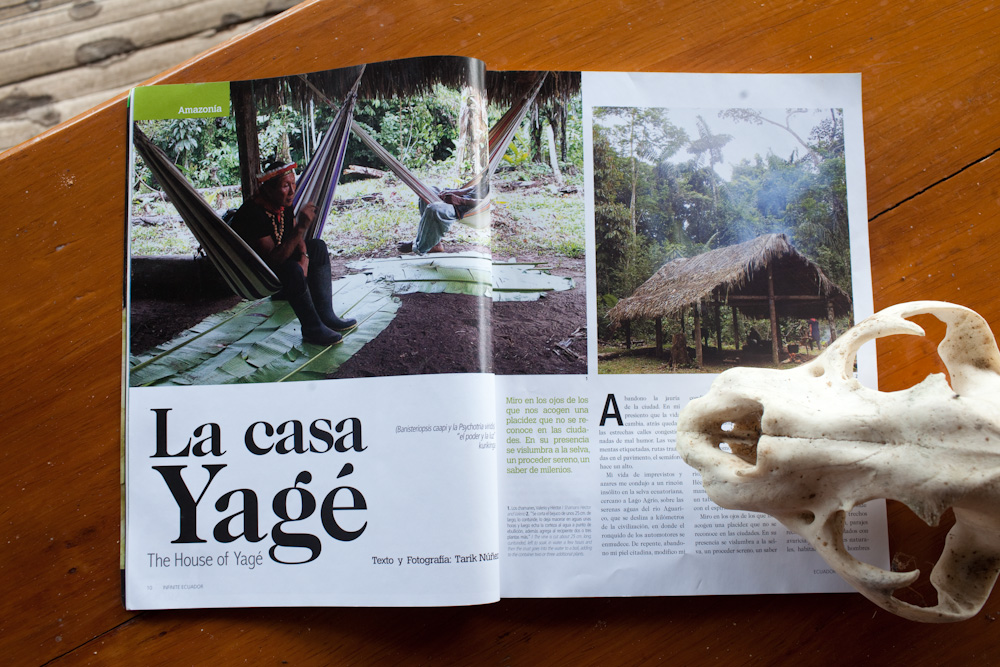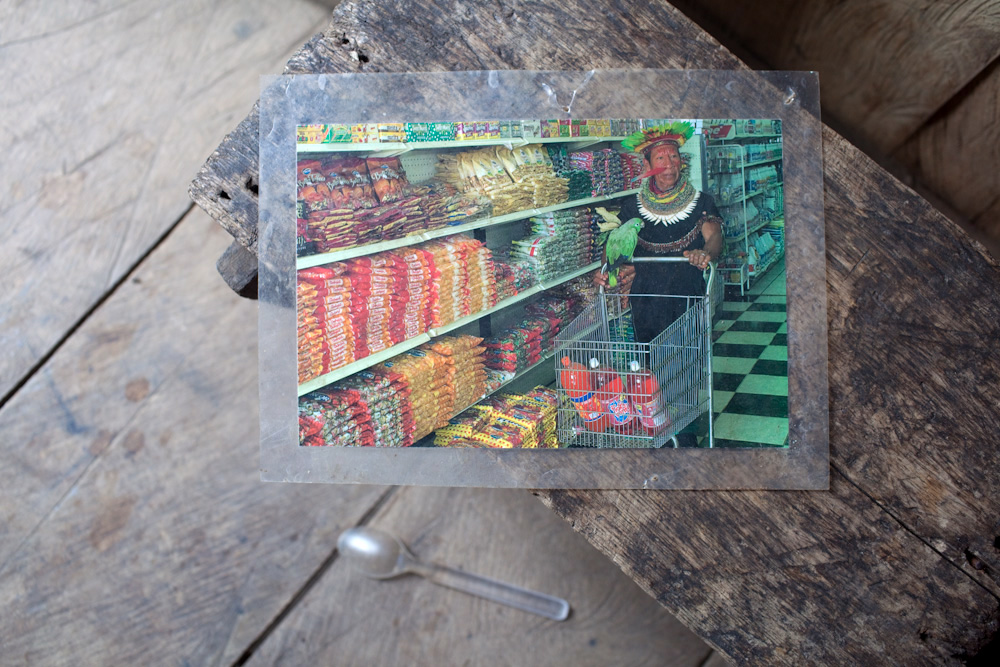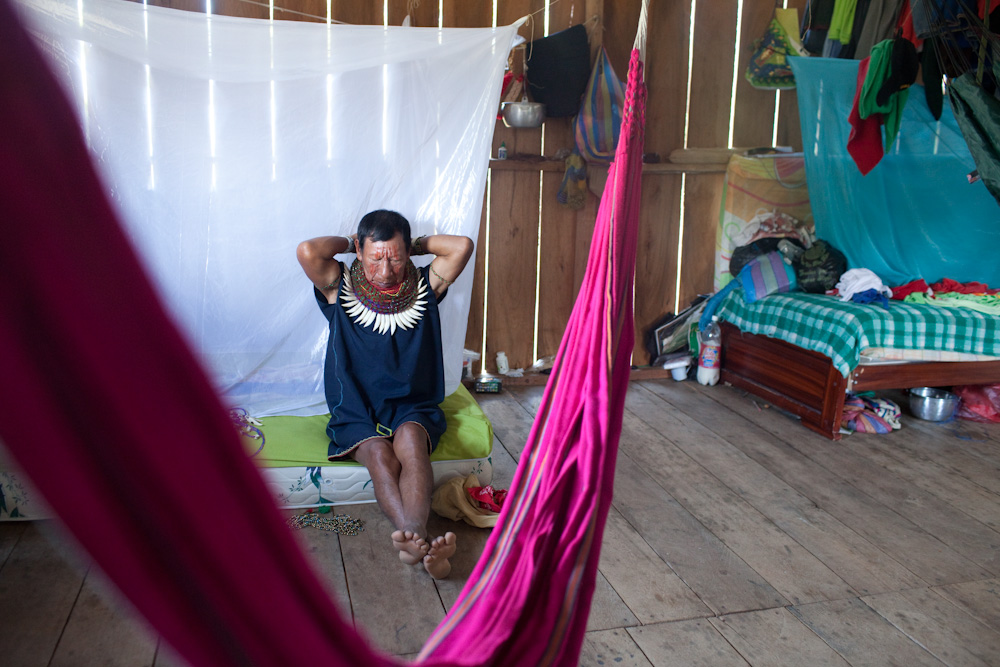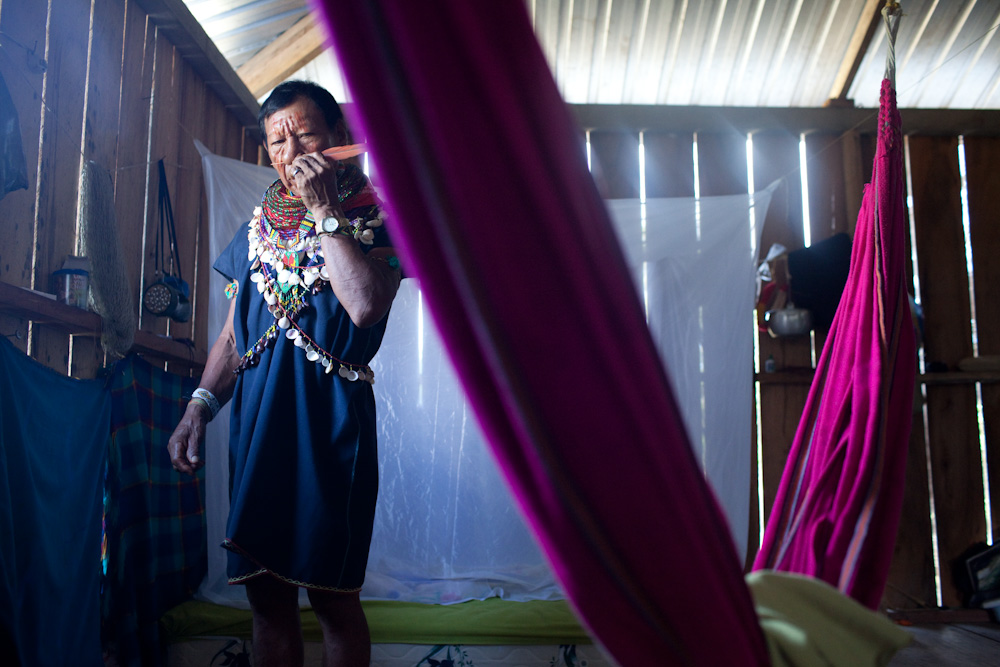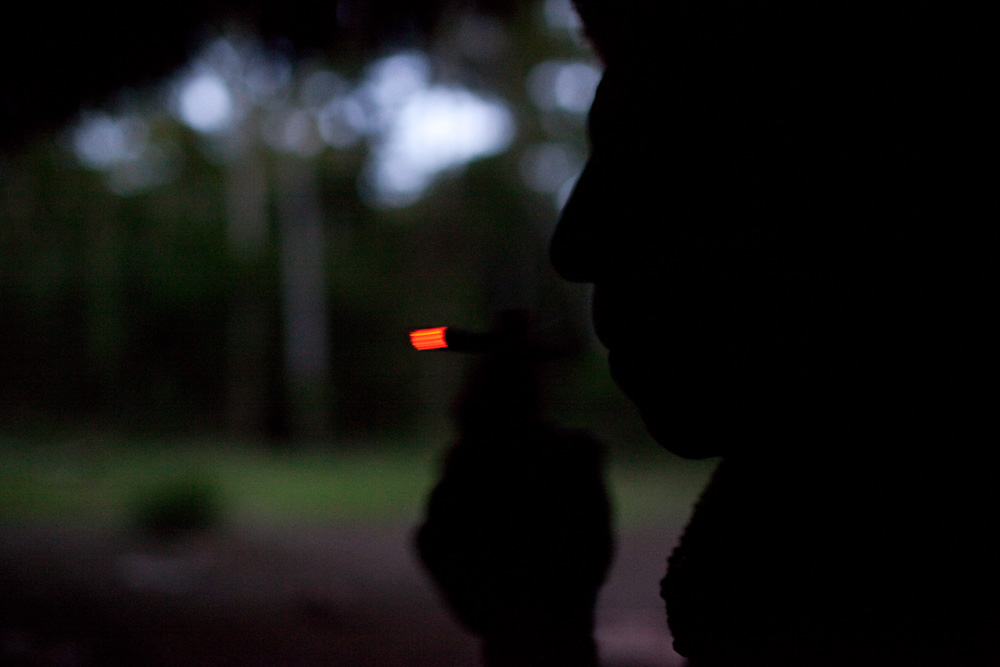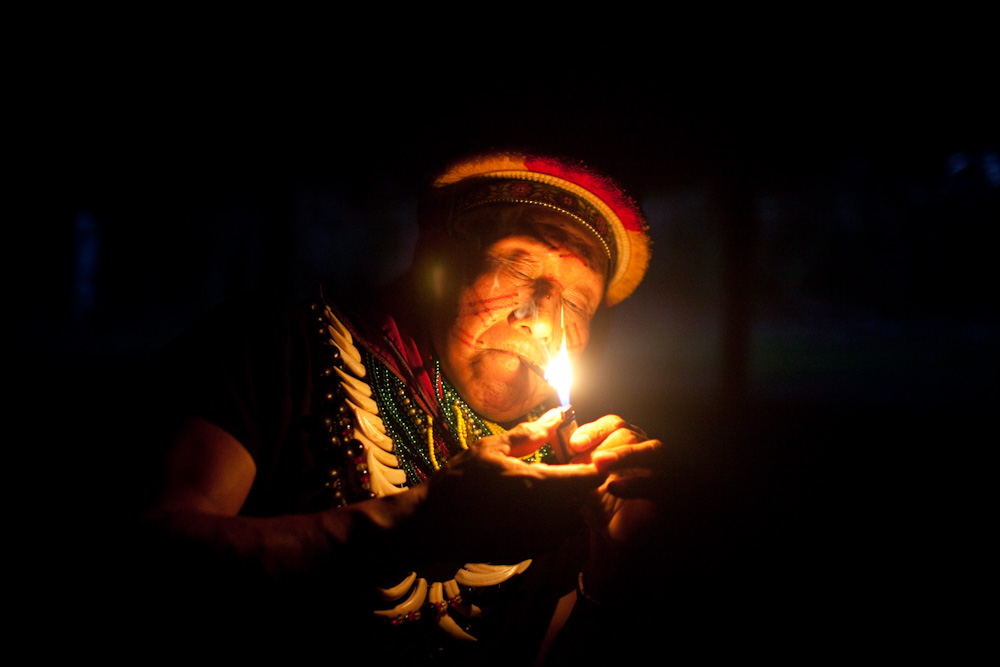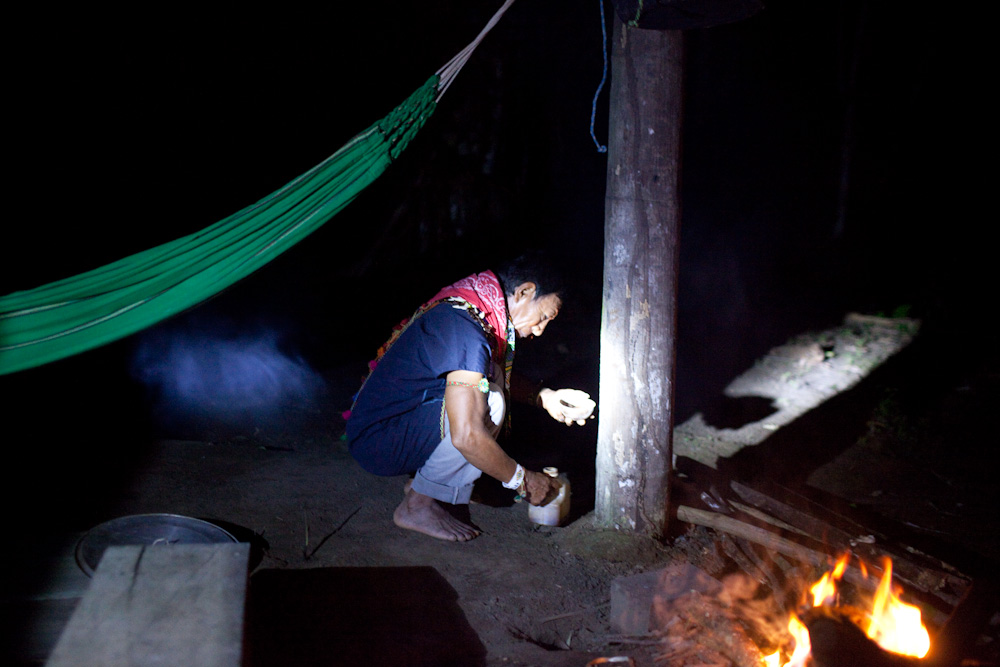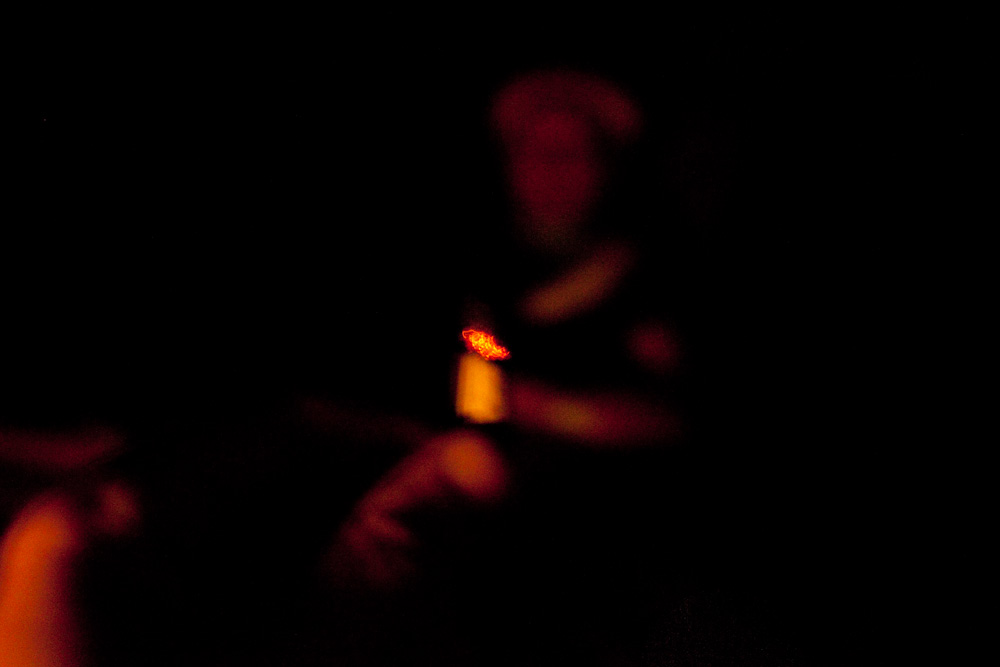Czas zatem zanurkować w pamięć i zobaczyć czy coś da się wydobyć. Dureno, ta wioska Cofanów była bowiem pierwszym miejscem do którego trafiłem zaraz po przylocie do Ekwadoru, w listopadzie 2013. Aż trudno uwierzyć, że minęło niemal pół roku. Czas jest czymś bardzo dziwnym w moim życiu, dawno przestał być jednoznaczną linią, po której sunałbym równomiernie od punktu A do B. Nasycenie zwrotami akcji, zaburzenie kolejności pór roku, psychodeliczne podróże, przyspieszenie i zwolnienie, przejścia między światami przeładowanymi kalendarzem i technologią odmierzającą wszystko i wszędzie, a światem organicznych cykli, rytmu natury, wreszcie fotograficzna rejestracja wielu ważnych momentów i ich ponowne i wielokrotne przeżywanie dużo później, wszystko to powoduje, że żyję w ciągłym treningu dekonstruowania tego czym jest czas. Zdarzenia z wioski Cofanów z listopada oddziałuja na to co dzieje się we mnie teraz i nie wiem zatem co ja w zasadzie pamiętam i czym jest pamięć. Czasem notuję, ale jak się okazuje na temat Dureno nie zanotowałem ani słowa.
…
It is time now to dive into the memory and see what can be excavated. Dureno, this Cofan village was actually the first place I came to right after my arrival to Ecuador in Novemeber 2013. It is hard to believe that nearly half a year passed. Time is something extremely weird in my life, it has long ago stopped being a clear line to be followed at a steady, even pace, from A to B. Saturation with unexpected twists of action, disrupting of the order of seasons, psychedelic and physical journeys, speeding and slowing down, transition between worlds of overabundance of clocks and calendars and technology measuring all and always, and the world of organic cycles and natural rhythm, finally, photographic registering of many crucial moments and their re-living at multiple times, much later, all that accounts for the state of living in constant training of deconstructing what time is. The events from Cofan village that November affect what is happening in me now, and therefore I do not know what I actually remember and what memory is. Sometimes I am taking notes, but it appears I haven’t got a single word written down from Dureno.
Kiedy przeglądam zdjęcia szamanów z którymi tam pracowałem, mój przyzwyczajony przez Internet do wielotorowej stymulacji umysł generuje boczne wątki, niczym otwarte kolejne okienka przeglądarki odsuwające mnie od sedna sprawa jak Facebookowe obrazki odrywają od roboty czekającej na dokończenie. Ta dygresja pokazuje jednak czasem inną perspektywę, pokazuje połączenie. Ostatnie lata były dla mnie surfowaniem globalnego Youtuba kultur i religii, po troszku, po kilka minut z każdego kawałka, można powiedzieć, “po łebkach”. Był czas kiedy się tym umartwiałem. Potem uświadomiłem sobie, że dane jest mi coś, co dla wielu specjalistów jest nieosiągalne, dany jest mi dystans, z którego coś innego widać. Stałem się fanem bocznej ścieżki, miłośnikiem manowców.
Jak to się stało, co mnie prowadzi do tego, czemu tak się ułożyło, czy to nauczycielka historii w liceum z jej obsesją “syntezy”, czy jeszcze wcześniej, rozpoczynane i nigdy nie kończone wątki w komiksach i opowiadaniach płodzonych w podstawówce? Gdzie jest źródło, gdzie jest początek, zapłon i motyw. Tajemnica, zagadka i ekscytacja poszukiwań w coraz ciemniejszych głębinach.
Ale do rzeczy. Kiedy oglądam portety Alejandro i Valerio przenoszę się do Bengalu, przenoszę się, kolejny raz, do opowieści o Baulach ( http://blog.swiatoslaw.com/?cat=59 ) , i do najsłynniejszego chyba wiersza ich mistyka – nauczyciela, Lalon Fakira. Wiersza o duszy.
“Gdzie leży tajemnica ludzkiej duszy?
Skąd przybyłem, dokąd pójdę?
Lalon mówi :
Jakże ten dziwny ptak,
wciąż z klatki ulatuje i do niej wraca
Gdybym tylko mógł go schwytać
Splątałbym go więzami swojego serca
Ta klatka ma osiem pokojów i dziewięć bram
Ponad nimi główna komnata, sala luster.
O umyśle który ją stworzyłeś i w klatce jesteś zakochany
I nie wiesz o tym że z surowego bambusa zrobiona,
rozpaść się może w każdej chwili
Pozwól wcześniej ptakowi odlecieć.”
…
When I browse the pictures I took of the shamans from Dureno, my mind, accustomed by Internet to be simultaneously stimulated on many levels, it generates side stories and associations, in manner of multiple windows of net browser opened, moving me away from the main issue, as Facebook pictures move away from the work waiting to be done. This digression shows however ( sometimes ) another perspective, it can show connecting threads, not visible from too close and deep. Recent years have been for me a time of surfing on global Youtube of cultures and religions, bit by bit, a few minutes out of each piece, one could say, superficially. There was a time when I did worry about that. Then I realized, that I have an opportunity for something not accessible to many specialists, I have access to special vantage point. I became a fan of the thicket, side path, a lover of detour.
How this came to be, what mystery is it inside, that led me to do that, was it the history teacher in high school, with her obsession for synthesis, or was it before, much earlier, begun and never finished threads in comics and stories I created in primary school years. Where is the source, the origin, the ignition and primal motivation? Secret, riddle and excitement of solving it, seeking answer in ever more profound depths.
But, coming to the point here. When I watch the portraits of Alejandro and Valerio I am transported, once again, to the story of Bauls of Bengal ( http://blog.swiatoslaw.com/?cat=59 ) and to the most famous poem of their guru mystic – Lalon Fakir. The poem is about the soul.
“Where lies this mystery of human soul?
Where from I came and where shall I go?
Lalon’s says:
How does the strange bird
flit in and out of the cage,
If I could catch the bird
I would put it under the fetters of my heart.
The cage has eight cells and nine doors.
Above is the main Hall with a mirror chamber
O my mind, you are enamoured of the cage..
little knowing that the cage is made of raw bamboo,
and may any day fall apart
Lalon says: Open the cage, look how the bird wings away!”
Podczas pierwszej wizyty poznaję Alejandro. Przyjechałem tu prosto z lotniska, przesiadając się w Quito, po wylądowaniu, na nocny autobus do Lago Agrio i dalej do Dureno, niewielkiej osady nad brzegami rzeki Aguarico. Alejandro znany jest mi poprzez poznańskiego psychologa religii Andrzeja Pankallę, który pracował z nim podczas badań terenowych trzynaście lat wcześniej. Jednym z owoców tamtej podróży był lekko sensacyjny, co tu się dziwić, materiał TVN pod tytułem “Nie Do Wiary : Ayahuasca”, do znalezienia online, oraz praca pod tytułem Psychologia Mitu, której rozdział poświęcony jest yage i Cofanom. Zostawiam egzemplarz w prezencie dla Alejandro, bawi go fakt, że znajduje się na okładce, ale zupełnie nie pamięta jej autora.
…
On my first visit to Dureno I meet Alejandro. I came here straight after landing in Quito, changing plane for an overnight bus to Lago Agrio and onwards to this small settlement on the banks of Aguarico river. I know about Alejandro from a Polish psychologist of religion, Andrzej Pankalla, who worked with him, during field research, around 13 years back. Results of that journey were not only scientific papers including a book called “Psychology of Myth”, but also TV programme featuring Alejandro and others. I leave a copy of the book to Alejandro as a gift. He is amused, seeing his portrait on the cover, but doesn’t recall meeting author at all.
Spędzam tu dzień i noc, nastepnego dnia mamy pić. Okazuje się jednak że w wiosce jest zła krew. Cofani są bardzo tradycyjni, i ściśle przestrzegają pewnych tabu, zwłaszcza związanych z płcią i seksualnością, których złamanie może mieć bardzo poważne konsekwencje. Trwa tu trudny poród, przedłuża się, i oznacza to obecność kobiecej krwi, która sprowadzić może bardzo złe duchy, a że yage otwiera na nie, szamani obawiają się. Podoba mi się, że Alejandro nie kuszą pieniądze jakie mógłby dostac za ceremonię, i woli powiedzieć mi abym przyjechał kiedy indziej.
Cofani z Dureno mają renomę, są znani z pracy z yage. Rufino, inny szaman który tu mieszka, i z którym pracował Andrzej, wyjeżdża właśnie na tournee po Kolumbii. Z kolei do Dureno, dość łatwo dostępnego z Quito, zajeżdżają czasem dziennikarze. Dużo później, gdzieś indziej w Ekwadorze znajduję magazyn z artykułem o wiosce. Z kolei w domu Alejandro napotykam fotkę jaką dla reklamy zamówił sobie właściciel supermarketu w Lago Agrio.
…
I spend here a day and a night. Following day we are supposed to cook and drink. It appears though, that there is bad blood in the village. Cofans are very traditional and strictly follow certain taboos, especially those related to gender and sexuality. Breaking them can have dire consequences. Difficult birth process is going on, and it means presence of female blood, which can bring evil spirits, and as yage opens one up to the spirits, shamans are afraid. I like that, I like Alejandro not being tempted with money he could earn for the ceremony and preferring to tell me to come some other time.
Cofans from Dureno are famous for their work with yage. Rufino, other shaman living here, who had also worked with Andrzej, he is about to leave for a tour of Colombia, invited to run ceremonies. Dureno, being easily accessible from Quito, sometimes hosts journalists. Much later, somewhere else in Ecuador I come across a magazine with a story about the village. And in the house of Alejandro I find a photo, comissioned for publicity purposes by the owner of supermarket in Lago Agrio.
Wracam do Dureno jakiś miesiąc później, z moimi klientami. Dziewczyny nie będą już pić, zadowalają się egzotycznymi fotkami a pani psychiatra usilnie próbuje dopasować rzeczywistość do obrazu świata jaki wyczytała i wykoncypowała. Valerio i Alejandro spokojnie opowiadają to, na co mają ochotę, zupełnie ignorując zadane im pytania w rodzaju “czy uważają, że wszyscy jesteśmy jednością”. W odpowiedzi na pytanie o to jak do tego doszło, że został szamanem, Alejandro mówi jak to zaczął pić ayahuaskę i w jakim wieku, no i potem pił więcej i częściej, no i tyle, chciał pomóc swoim bliskim i rodzinie. Tyle razy już słyszałem tą historię, w różniących się nieco detalami wersjach ale zawsze urzekająco prostą.
…
I come back to Dureno around a month later, together with my clients. Girls will not drink anymore, they are satisfied with exotic photo opportunities. The psychiatrist who is with us keeps on trying to fit reality she encounters into the box of her worldview and preconceptions. Valerio and Alejandro just talk about whatever they feel like, completely ignoring questions she asks them, questions like “whether you agree that we are all one?”. In response to the query how it happened that he became a shaman ( what extraordinary event? ) Alejandro says how he began drinking yage, and then more and more, and that he wanted to help his family and relatives. I have heard that story so many times, in versions that only slightly differ in details, but are always charming in their simplicity.
Nadchodzi czas ceremonii. Alejandro przygotowuje się, zakłada rytualny strój, maluje. /// The time of ceremony is near. Alejandro gets ready, puts on his ritual outfit and paint.
Noc spędzimy poza wioską, w casa de yage, chacie medycyny. Z dala od dźwięków, zapachów, obecności ludzi, blisko lasu i jego duchów. Płonie ogień i zapalony jest tytoń. Dym, prastare narzędzie ochrony przed Złym, to co oddziela nas od Dzikości. Czerwony punkt wokół którego ogniskuje się rozmowa. Punkt skupienia, święty oddech, duch rośliny wchłonięty do płuc > krwi > mózgu > duszy.
…
This night will be spent far from the village, in casa de yage, medicine hut. Far from the sounds, smells, presence of people, close to the forest and its spirits. Fire is burning, tobacco is lit. Smoke, ancient tool of protection from the Evil, something what separates us from the Wilderness. Red point which centers conversation. Point of focus, sacred breath, spirit of the plant inhaled, into lungs > blood > brain > soul.
Po obu stronach domu duchów, kobiety i mężczyźni osobno. Nadszedł czas, pijemy. A potem jest już tylko ciemność i śpiew. I ceremonia która do dziś się nie kończy.
…
Separated on both sides of the hut, men and women. Time has come, we drink. And next there is only darkness and chanting. And the ceremony which lasts to this day.
Nadchodzi brzask. To właśnie wtedy wypuszczane są Hugin i Munin, dwa kruki należące do Tego, który poświęcił jedno oko aby napić się ze studni wiedzy. Ptaki te podróżują po świecie i przynoszą mu wieści. Hugin to Myśl, a Munin to Pamięć.
z sagi Grímnismál, Pan Kruków martwi się :
Huginn ok. Muninn fliúga hverian dag
iörmungrund yfir;
óomk ek of Huginn, at hann aptr ne komit,
þó siámk meirr um Muninn.
w tłumaczeniu :
“Przez Środkowy Świat, wzdłuż i wszerz, każdego dnia
Lecą Hugin i Munin;
Boję się, że Hugin nie podoła lotu,
Ale bardziej obawiam się o Munina”.
…
The dawn is coming. This is when Hugin and Munin are released, two ravens belonging to this One, who sacrificed his eye to drink from the well of wisdom. Those birds travel the world and bring him tidings. Hugin means Thought and Munin means Memory.
from Grímnismál saga, the Raven God is worried :
Huginn ok. Muninn fliúga hverian dag
iörmungrund yfir;
óomk ek of Huginn, at hann aptr ne komit,
þó siámk meirr um Muninn.
in translation :
“O’er Midgard Hugin and Munin both
Each day set forth to fly;
For Hugin I fear lest he come not home,
But for Munin my care is more”
-
Odnajdziecie to miejsce łatwo. Z Lago Agrio weźcie autobus, za mniej niż dolara, do Dureno. Trzeba wysiąść przed główna częścią wioski, przy “communidad Cofan Dureno”, potem przeprawić się na drugą stronę rzeki za jakiegoś dolara. Ceremonia to 30 USD od osoby, będą też pewnie prosić o jakieś datki za nocleg. Pytajcie o Alejandro, Valerio lub Rufino, wszyscy ich znają.
…
You will find this place easily. Take a bus from Lago Agrio, for less than a dollar, going towards Dureno. You must disembark before main village, ask for “communidad Cofan Dureno”, then cross the river, for another dollar. Ceremony here costs 30 USD per person and on top of that you will be asked some donation for food and lodging. Ask for Alejandro, Valerio or Rufino, all know them.

